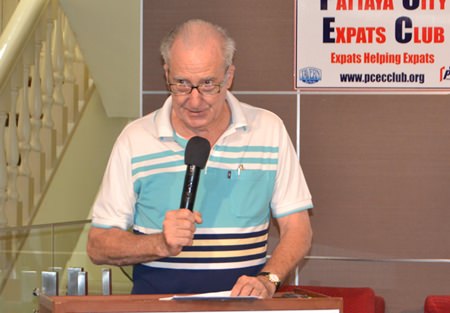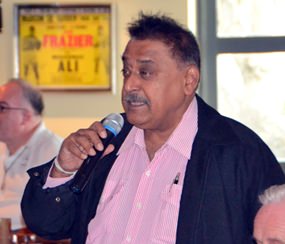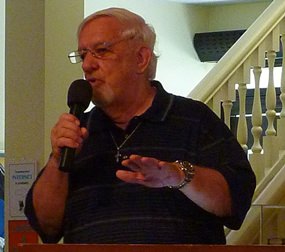One of the advantages of coming to Thailand for medical care is that one can combine treatment with tourism. This was the topic of Dr. Iain Corness, consultant with Bangkok Hospital Pattaya (BHP), to the Pattaya City Expats Club (PCEC) at their Sunday, July 20, meeting. Dr. Iain is a qualified medical doctor who has designed and raced cars, and has been a professional photographer, maitre d’ in his own Thai restaurant, and author of the bestselling books “Farang, Thailand Through the Eyes of an Ex-pat” and “Farang, the Sequel.” He also writes the Pattaya Mail’s medical, racing and dining out columns.
He began by saying that medical tourism refers to patients travelling to another country to get medial care, rather than have treatment in their own country – not to be confused with people on an overseas holiday needing treatment at their destination; or expats spending part or all of the year in a foreign country and in need of treatment.
 Dr. Iain Corness provides the PCEC with information about medical tourism to Thailand; noting that although there are many statistics bandied about, they are at best guesses since no one is separating out the medical tourists from the expats or the people on holiday.
Dr. Iain Corness provides the PCEC with information about medical tourism to Thailand; noting that although there are many statistics bandied about, they are at best guesses since no one is separating out the medical tourists from the expats or the people on holiday.
And therein is the rub in terms of trying to get an accurate count of the numbers of medical tourists – because no one is separating out the medical tourists from the expats or the people on holiday. Thailand and other countries publicise numbers for medical tourists, but they are just guesses, Dr. Iain explained. The Tourism Authority of Thailand (TAT) reported that in 2013, the number of medical tourists increased by almost 10%. And it foresees annual growth of more than 10% a year over the next five years. Others have predicted a 16% annual growth rate. But one could pick any number!
 Pattaya Mail’s Peter Malhotra advises PCEC members and guests that the next issue of the Pattaya Mail will be celebrating their 21st anniversary.
Pattaya Mail’s Peter Malhotra advises PCEC members and guests that the next issue of the Pattaya Mail will be celebrating their 21st anniversary.
Although there is no real handle on the exact number of medical tourists, Dr. Iain said we know that they are going up. A survey of 3,000 Americans predicted that outbound medical tourism will experience explosive growth in the coming years. The reasons include the following: Health care costs in the U.S. are increasing at a rate of 8% a year; the safety and quality of care in many offshore settings has improved; customers are willing to travel to obtain care that is less costly and safe; and offshore facilities usually have shorter waiting periods.
The most common procedures sought by medial tourists are cosmetic, dental, orthopaedic, cardiovascular and, perhaps surprisingly, renal dialysis. For people needing dialysis three times a week, travel was almost unthinkable. However, if coming to Thailand, it is possible to hop on a plane, go directly to a hospital equipped for dialysis, receive treatment and then play tourist between treatments. Dr. Iain mentioned that arrangements for dialysis are usually made before the patient departs so that they are expected and treatment requirements are known – also, in the case of BHP, they can arrange transportation direct from the airport to the hospital if needed.
For Americans, cosmetic surgery is the biggest growth area for medical travel. Cancer treatment and infertility treatment are two other areas expected to grow significantly.
The TAT has a five-year strategy to establish Thailand as a leading world medical hub. Thailand has 33 “world class” spas and 26 JCI-certified hospitals. (JCI = Joint Commission International.) It also has Thai traditional medicine. The TAT plan covers seven S’s: Safety, Savings, Service, Staff, Sun, Sea and Sand. To which, Dr Iain jokingly noted one could add an eighth “S” for Soi 6 in Pattaya (i.e. the joys thereof).
Bangkok Hospital Pattaya is accredited by JCI. Dr. Iain said that the quality of health care at the main international hospitals in Thailand, including Bangkok Hospital Pattaya, is better in most instances than what is available in Australia or the U.K.
 PCEC member Roger Fox keeps an eye out for ocean cruises that may interest Pattaya Expats. Here he describes an upcoming cruise from Singapore to Hong Kong that currently has space available at a very reasonable cost.
PCEC member Roger Fox keeps an eye out for ocean cruises that may interest Pattaya Expats. Here he describes an upcoming cruise from Singapore to Hong Kong that currently has space available at a very reasonable cost.
He mentioned that the medical tourists at BHP are mainly Russians, followed by Britons, Australians and Americans. Further, about 50% of the Russians and the Australians request cosmetic surgery whereas the proportion coming for cosmetic surgery from the U.K. and the U.S. are about half that.
It is estimated that in 2010, six million Americans travelled abroad for medical care. This has worried the U.S. medical establishment, Dr. Iain revealed, so they are looking at ways to discourage such travel, including possibly having U.S. heath insurers decide not to cover services provided offshore. In Asia, three countries in particular compete with Thailand for medical tourism: India, Singapore and Philippines, largely because English is well-established in these countries as a major language.
Some concerns have been raised about medical tourism. One is that care coordination for patients returning home is often lacking. Dr. Iain explained that domestic providers are often hesitant to take on complicated and open cases from unknown providers – let alone from foreign ones. A second concern is liability, medical tourism may save patients money, but the patients face increased risks. If anything were to go wrong in a foreign country, the patient has to work through the host country’s legal system, which can be difficult.
If you want to know more about medical tourism at BHP, contact Wan in the International Marketing Department. Call +66 38259999 from abroad or dial 1719 locally. Enquiries can also be made through the BHP website: www. bangkokpattayahospital.com/en.
After Dr. Iain’s informative talk, Master of Ceremonies Richard Silverberg brought everyone up to date on upcoming events and called on Roy Albiston to conduct the always informative Open Forum where questions are asked and answered about Expat living in Thailand, especially Pattaya.
For more information on the PCEC’s many activities, visit their website at www.pcecclub.org.




